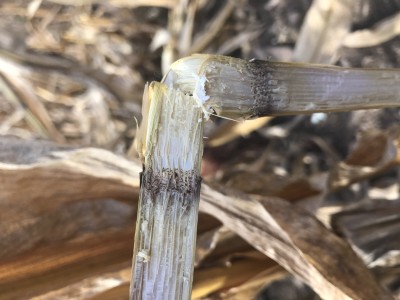Corn Diseases and Mycotoxin Contamination of Corn Grain in Southwest New York
Joshua Putman, Field Crops and Forage Specialist
Southwest New York Dairy, Livestock and Field Crops Program

Mycotoxin is a general term for a poison produced by a fungus and can be toxic when inhaled, absorbed through the skin, or consumed at very low concentration levels. Corn and small grain cereals are especially prone to mycotoxin accumulation in their seed tissue. In the past, it was believed that the fungus affected grain only during the postharvest stage, particularly when grain was stored under suboptimal conditions (hot and humid/moist). Although these factors can promote fungal growth in storage, this occurs during the growing season as well. In the field, mycotoxin outbreaks are seasonal, and will occur under favorable weather conditions for disease development. Bird and insect damage can also increase the risk for mycotoxin contamination. In addition to mycotoxin contamination of grain crops, mycotoxigenic fungi cause ear rots and stalk rots in corn. Some corn fields in SWNY are beginning to lodge due to stalk rots. Photos were sent to Dr. Gary Bergstrom, Field Crops Plant Pathologist at Cornell University, and it was confirmed that we are experiencing stalk rot damage in corn fields throughout the state. "It is believed that drought stress was a likely contributor this year," says Bergstrom. To help reduce the risk of late-season corn disease and mycotoxin accumulation, here are a few practices to consider: plant locally adapted corn hybrids, avoid corn-after-corn rotations, apply appropriate amounts of fertilizer, and plan ahead. An article written by Dr. Bergstrom, provides detailed information about mycotoxins of corn in the Northeast. Contact Josh Putman if you are experiencing lodged corn.
Upcoming Events
Boots in the Barn: Cornell Dairy Research Updates
January 13, 2026
January 20, 2026
January 27, 2026
February 3, 2026
February 10, 2026
February 17, 2026
February 24, 2026
Join us for some or all!
Deerworm and Flukes in Small Ruminants Webinar
February 25, 2026 : Deerworm and Flukes in Small Ruminants Webinar
Dr. Mary Smith from Cornell's College of Veterinary Medicine and Dr. Rachel White from UMaine Cooperative Extension will be discussing the lifecycles, signs, prevention, and management of deerworm and liver flukes in small ruminants.
NYSDEC How to Get Certified Course
March 3, 2026 : NYSDEC How to Get Certified Course
Ellicottville, NY
NYSDEC training course in preparation to take the pesticide applicator exam.
Announcements
Cows, Crops & Critters Newsletter Sponsorship
TRYING TO REACH GROWERS AND AGRIBUSINESSES IN OUR SOUTHWEST REGION OF NEW YORK?Weekly Email Update: Shared with 625+ households who have signed up with our program.
Monthly Paper Mailer: To reach our stakeholders and farmers who lack internet access, we send out a monthly mailer where your company's logo and contact information would be featured with a mailing list of 330+ households.
If you sponsor our weekly and monthly publications you reach approximately 955 households.





